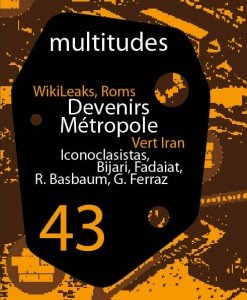Réponse à quelques critiques Nord-AméricainsA blog proposal to dissuade the American Left from voicing support for Liu Xiaobo’s receipt of the Nobel Prize was widely circulated recently. The author was critical of the Charter 08 document that got Liu imprisoned last year, calling it “ahistorical” and “naive”. It was said to be “far too general” in its propositions and above all lacking in the “more promising analyses of global labor”…
In an essay, coming from my dissertation, I argued that Liu’s positions before and after the 1989 Tiananmen Massacre amounted to a sustained critique of the apparatus of sovereignty. Strategic shifts between philosophical dissidence and political dissidence produced in the Liu of that era a nuanced and highly mobile form of critique (critical of both “China” and “the West” at the same time); I called this “Liu Xiaobo’s internal dialectic of exilic dissidence against the Chinese exception [of sovereignty.”
At the end of that article, I predicted the path of internal exile and critique of sovereignty chosen by Liu would inevitably lead to his increasing occlusion in the simulacrum of representational politics between East and West, as his room for maneuver became increasingly limited to political dissidence (at the expense of any strategic displacement by philosophical dissidence which has been at the core of his practice since the 1980s). Not surprisingly, this is what has actually transpired. It was also to be expected that many of the intellectuals in the East and West who had formerly been joined in their dismissal of Liu now divided into antagonistic camps, like respective cheering sections for the particular and the universal.
This is not the place to review the critique of universalism and particularism. Suffice it to say, however, that the most persistent manifestation of the complicity between the two in the modern period consistently concerns the legacy of anthropological difference inherited from colonialism (not just “racism” but also the much broader idea that human populations can be understood according to a taxonomic scheme analogically based on biology). Today, the system of anthropological difference is the organizing principle not just of the Chinese state, but of all States in their relation to migratory labor…
As a State device (that corresponds to the emerging Global State), the Nobel Prize obviously cannot be expected to offer an avenue of critique against forces such as anthropological difference that have become essential to State control of populations today. Yet does that mean that the significance the award to Liu bears for a potential politics in China and on its global borders has no positive meaning? I truly do not think so. The very “generality” of the rights espoused by Liu and the authors of Charter 08 permits both a rejection of the State and an embrace of the multitude of potential politics.
The real naivete and ahistoricism, would be to imagine that the struggles of labor and migratory populations in (and out of) China could advance, beyond the assertion of claims and benefits, to the valorization of the common without passing through the circuits of political dissidence—admittedly imperfect and compromised—practiced by Liu and others against the Total Surveillance State.
It would be a strategic mistake to overlook the ways in which the Total Surveillance State is becoming more and more deeply integrated, largely through logistical and informational technologies associated with financial capital, across apparently antagonistic regional divisions such as North America and China. Yet we are still very very far from realizing non-Statist (i.e., multitudinal) networks across these very same lines. Much talk has been made of how the award will encourage other dissidents in China. Perhaps. But just as possible, it could also serve to strengthen the hand of dissidents everywhere against the rule of financial capitalism, especially given the dominant role being assumed by the Chinese capital. Of course, it is up to us to wrest the meaning of this Nobel Prize out of the hands of Statist logic and reappropriate it for the multitude, against the Total Surveillance State whereever it is located. In order to do that, courageous dissidents like Liu Xiaobo are going to be necessary, aren’t they?!
À propos de Liu Xiaobo _ Réponse à quelques critiques Nord-Américains
Synthèse de Frédéric Neyrat
À l’occasion de la remise du Prix Nobel de la Paix 2010 à Liu Xiabo, Jon Solomon interroge le sens de la dissidence politique à l’ère globale. Une certaine critique de gauche tendrait en effet à invalider la portée de revendications relatives à des « droits » abstraits, « anhistoriques », détachés des conditions réelles du travail : en demandant des choses trop générales (comme les droits de l’homme par exemple), on raterait la spécificité des cas. Or, nous dit Jon Solomon, l’axe du Général est précisément ce qui peut permettre de remettre en cause la « complicité » de l’« Universalisme » et du « Particularisme » (complicité de la particularité des politiques nationales-étatiques qui soutiennent l’universalité du capitalisme financier, ou de la particularité des « différences de civilisation » qui permettent de maintenir l’existence de souverainetés intouchables). Au lieu de discréditer les revendications générales, mieux vaudrait les squatter, les transformer en moyens politiques. Si le Prix Nobel est certes un « appareil d’État » (Althusser), celui-ci prend un tout autre sens à l’ère de l’« État-mondial-sans-société », pour reprendre le concept de Jacques Bidet cité par l’auteur : « c’est à nous d’arracher le sens du Prix Nobel hors des mains de la logique étatiste, afin de la restituer à la multitude, contre l’État de la Surveillance Totale, où qu’il soit » (Jon Solomon). Si Universalité et Particularité sont en effet partout complices, partout la Généralité peut devenir une arme de dissidence efficace. À la fois contre l’État incriminé, en l’occurrence ici la Chine, et contre la démocratie financière globale, que l’Occident théorique croit encore incarner.

